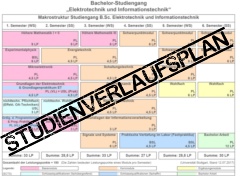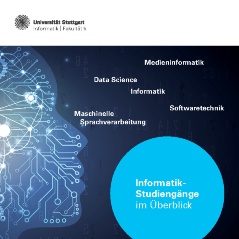The progressing of the digitization in all areas of work and life leads to enormous amounts of data (big data), ranging from machine data in the factory and sensor data from the car to social media data from the web. The superordinated task of data scientists is the profitable analysis and use of this data for various organizations. On the one hand, data scientists create analytical questions for predefined goals in order to derive the necessary IT and analysis architectures, e.g. to reduce rejects through a pattern-based analysis of quality data in production. On the other hand, data scientists recognize the potential of different data sources in order to develop appropriate analysis methods and data storage concepts, e.g. for new, data-driven services of an automobile manufacturer based on traffic, weather and social media data. You will acquire the necessary quantitative-statistical and computer science-oriented basic knowledge as well as a pronounced interface and communication competence in the Data Science program at the University of Stuttgart.
The Study Choice Compass B. Sc. Data Science with
- Structure and contents of the study program
- an expectation check and example tasks
The Bachelor's program in Data Science is designed for six semesters. The first two semesters form the basic studies, the last four are used for specialization. The degree programme is divided into compulsory and elective areas. Courses in the compulsory area are mandatory for all study participants, while within the elective areas priority areas can be set independently.
In the first two years of the Bachelor's degree program, the main focus lies on learning the basics of data science, mathematics and theoretical and practical computer science. From the 3rd semester, the curriculum focuses on in-depth modules. Exercises offer the opportunity to repeat, deepen and apply the contents of the corresponding lectures both theoretically and with smaller programming tasks. Additionally, Data Science students work on a project in small groups. In such a project, a solution for a data science task is developed, implemented and evaluated. The topics for these projects usually come from the various research groups of the department. Above all, the project helps to deepen important foundations for later professional practice. The elective area creates a free space for students in which they can put together their own study contents according to their inclination or desired career orientation. Both a deepening and a supplement of the content relevant for data science is possible here.
Modules
The degree programme is divided into modules for which the credit points (CP). They will be asigned after passing the module examination or after passing all module partial examinations. Modules have a size between 3 and 18 CP. The modules comprise content-related courses and extend over one or two semesters at most.
Module handbook
Detailed descriptions of the individual modules can be found in the Module handbook of the respective degree program. However, since the module manuals of the individual degree programmes must be revised and, if necessary, updated every semester, you will find the current version of the module handbook of your degree programme for the current semester in the C@mpus system.
Credit Points
During the course of study, credit points (CP) must be acquired by passing modules. The average number of CP per semester is 30. One CP corresponds to a workload of about 30 hours. Credit points are therefore a quantitative measure of the time required for the study. A total of 180 CP are required for the Bachelor of Science.
The formal requirements for the Bachelor's degree program in Data Science are the general university entrance qualification (Abitur) or a corresponding equivalent qualification as well as qualifying knowledge of German, as the main language of instruction is German. In addition, English language skills must also be proven at least at level B2. Previous knowledge of programming is not required, but it helps to get started. Sound mathematical knowledge is particularly recommended in order to be able to follow the study contents adequately. Since the change from school to university is often perceived as difficult, especially in the so-called MINT subjects (mathematics, computer science, natural sciences, technology), the University of Stuttgart offers both preparatory courses and semester-accompanying courses for support in these subjects. Information on this can be found on the pages of the MINT-Kolleg.
The degree program B.Sc. Data Science has a restricted admission (30 places). An application is only possible for the winter semester of each year. It takes place online via the C@mpus portal of the University of Stuttgart. Information and forms can be found in the application information of the Central Student Advisory Service. The complete application documents must be uploaded to the C@mpus portal by 15 July of each year.
Deadlines
for the winter semester: July, 15
for the summer semester: April, 15 (entrance into a higher semester only)
For all further information, inquiries, individual advice, etc., our student advisory service is at your disposal. For general application questions, the pages of the Registrar's Office will also help you.
The fields of work of the graduates are wide-ranging. Both in the industries and in research, data processing is becoming increasingly important. Due to the specific training, the graduates are particularly qualified for professional and research branches that deal centrally with the procurement, administration and exploitation of data. Job profiles are, for example, Data Scientist, Data Curator, Date Engineer or Data Stuart. Due to their mathematical and information-scientific understanding, data scientists are used in a variety of IT areas, from data acquisition, administration, analysis and visualization to the implementation of entire software systems for data processing.
A good Bachelor's degree qualifies for a Master's degree program in Germany and Europe, especially for the Master's programs in the Department of Computer Science at the University of Stuttgart.
A Bachelor's degree is one of several prerequisites for an admission to a Master's program. Admission can also take place conditionally, i.e. previous to the successful completion of the Bachelor's degree. Currently, there are the following Master's degree programs in the Department of Computer Science:
- M.Sc. Informatik
- M.Sc. Software Engineering
- M.Sc. Artificial Intelligence and Data Science
- M.Sc. Computer Science (English program)
- M.Sc. Computational Linguistics (English program)
- M.Sc. Autonome Systeme (in cooperation with the Department of Electrical Engineering and the Faculties 4 and 7)
- M.Sc. Information Technology (English program; in cooperation with the Department of Electrical Engineering).
The four-semester Master's programme usually comprises 120 credits; its contents are research-oriented. The Master's degree is generally the prerequisite for a doctorate and further scientific work at the university or at any other research institution.
APPLY HERE
Ansprechpartner zum Studiengang Data Science

Katrin Schneider
Dr.Program Manager, Department Manager & Erasmus Coordinator of the Computer Science Department





